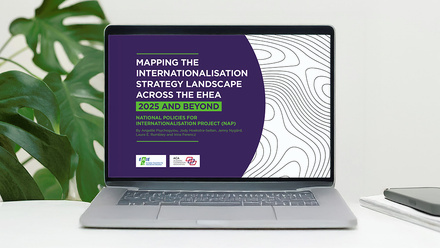Education abroad and the student employability gap

Professionals in the international education industry are focusing on making the case for education abroad – particularly in the form of international internships – by addressing its value in differing terms: the experience creates global citizens and career-ready graduates, builds essential (sometimes industry-specific) professional skills and cross-cultural competencies, strengthens linguistic ability and fosters a better understanding of critical world issues. If purposefully designed with any or all of these goals in mind (and effectively communicated to students), education abroad programmes have the potential to add important strategic value to students’ academic experience and personal and professional development.
In a post-Covid world, the agenda of higher education systems throughout the world will remain, of necessity, closely aligned with issues of global workforce development. Employers, in all sectors of the global economy, seek students whose education reflects their best practices, provides domain knowledge and introduces students to the cognitive, social and personal skills that are a good fit with a company’s human resource needs.
However, there is abundant evidence that, from the perspective of employers, international experience by itself is not enough. Rather, it’s critical that campuses devote more resources to, and become more intentional about, developing the intercultural competencies of students. While efforts to internationalise campuses have risen dramatically in recent years, there remains a need for more purposefully structured, high-impact intercultural experience (at home or abroad) to provide students with the skills and competencies employers are looking for to build their global workforces.
The employability gap
Although employers may actively seek to hire talent with the traits and skills associated with outcomes of education abroad, the research is largely inconclusive about the direct causal impact of international experience on employability or salary.
There is abundant evidence that, from the perspective of employers, international experience by itself is not enough
Studies in Europe, Japan, Australia and the United States (often based on self-reporting by students) have consistently found that education abroad has the potential to support student employability in terms of strengthening the skills and competencies valued by employers and thus increasing prospects of employment. What tempers such findings in academic research studies, or those of students (and alumni) in individual provider programmes, is that the majority of undergraduates – in all countries – who go abroad represent a privileged segment of their student populations. This element of ‘selectivity’ (students are more likely to have better prospects for employment after graduation due to their socio-economic background, gender, race, ethnicity or academic performance) may bias research findings. In the United States, with our large and increasingly diverse student population, this is especially true in studies of the employability outcomes of education abroad programmes.
What steps can campuses take to close the employability gap created by the highly selective population of students with access to education abroad? Some suggestions include the following:
- Cross-train staff in both career and study abroad offices.
- Actively engage faculty in dialogue about the potential impacts of education abroad on student employability.
- Proactively engage employers as partners in support of efforts to strengthen their commitment to career-ready graduates.
- Develop a purposefully integrated student advising practice across all facets of campus life.
The knowledge gap
There is evidence of a widespread gap in understanding among students about the value of international experience to their overall studies. This produces a mismatch between student expectations and those of employers, who expect the experience to better prepare students for the workplace. To close this knowledge gap, the benefits and impact of learning outcomes from well-structured international experience for student employability need to be effectively communicated to students and their families. One way to do this is through increased harmonisation of messaging and advising practices among faculty and education abroad programme administrators.
Employers need to know the following:
- How campuses will prepare students to succeed in the global economy.
- How campuses will align internationalisation priorities and strategies with the expectations of the global marketplace.
- Whether preparing global-ready graduates is the sole responsibility of a college or university.
- What role non-academic actors will play in contributing to the applied knowledge and skill development of students.
And here is what students need to know:
- Employers seek both field-specific knowledge and a broader range of skills applicable to a variety of fields.
- Employers are more likely to employ candidates with experience of work and collaboration with people from different backgrounds.
- Employers value internships most among applied and project-based learning experiences.
- Employers are less optimistic than students regarding students’ overall preparedness across learning outcomes.
To fully realise the value of international experience and maximise the return on investment by families, campuses must work to align expectations of students who participate in education abroad programmes with both academic requirements and the pragmatic needs of employers. Only then will the direct impact of education abroad on employability and salaries become as apparent as it should be.






